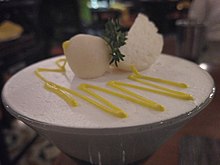 | |
| Alternative names | Rossomalai, Roshmolai, Rasamalei |
|---|---|
| Course | Dessert |
| Place of origin | Bangladesh India (West Bengal) |
| Region or state | Bengal, South Asia |
| Associated cuisine | India, Bangladesh, Pakistan |
| Serving temperature | Cold |
| Main ingredients | Chhena, malai, saffron, sugar |
| Variations | Comilla's roshomalai, Kolkata's roshomalai |
| Similar dishes | Rasgulla, Paskha |
Ras malai, also known as rasamalei, or roshmalai, is a dessert that originated in the Bengal region of Indian subcontinent. The dessert is called roshmalai in Bengali, ras malai in Hindi, and rasa malei in Odia. It is popular in India, Bangladesh and Pakistan.
Origin and etymology

The original term for ras malai is "rosh malai (Bengali: রস মালাই) which derived from the Classical Bengali word "rosho malai" with the same meaning.
The term is made with a Bengali word Rosh (Bengali: রস) which means sap and a Hindustani word Malai (Hindi: मलाई, Urdu: ملائی) which means clotted cream hence the name of the sweet sap of clotted cream.
The sweet became popular and exceedingly recognized when Sen brothers opened Matri Bhandar in 1930 and shared their ancestral recipe at Tipperah district (now Comilla, Bangladesh) of the Bengal Province. Which has been granted a geographical indication (GI) in Bangladesh. Soon in the mid 20th century, Ras Malai became a regionally popular sweets across South Asia apart from Bengal. Other variation includes Ras Malai of Kolkata by K. C Das.
The Sen brothers of Comilla operating under the Matri Bhandar brand claim to be the original maker of the dessert. On the other hand, K.C. Das Grandsons also claims that it was invented by K.C. Das in Kolkata.
Ingredients
Ras malai consists of flattened balls of chhena soaked in malai (a type of clotted cream) flavoured with cardamom. Milk is boiled and a bit of vinegar or lime juice is added to split it. The whey is discarded and the milk solids are drained, cooled and kneaded into a dough. The dough is divided into small balls and the balls are cooked in hot water with a bit of rose water added. The balls are then cooked in milk with saffron, pistachios and kheer as stuffing.
Variations

Different types of ras malai can be found in different areas such Rasmanjuri of Rangpur division. In Dhaka and Rangpur, the ras malais are similar in shape to the rasgullas, and round discs.
See also
References
- "The interesting story of the origin of Rasmalai, The Times of India". Retrieved 20 April 2024.
- "Ras malai: Traditional Cheese Dessert From West Bengal". TasteAtlas. Retrieved 5 September 2020.
- ^ Ayto, John (2012). The Diner's Dictionary: Word Origins of Food and Drink. OUP Oxford. p. 301. ISBN 978-0-19-964024-9. Retrieved 22 April 2020.
- "Odia Treat for Amit Shah & Other Dignitaries at Naveen Niwas |". 28 February 2020.
- Shavelson, Paul (2015). Flat Food, Flat Stomach: The Law of Subtraction. Post Hill Press. ISBN 978-1-61868-932-0. Retrieved 22 April 2020.
- "Geographic Indication – BFTI". Retrieved 26 March 2024.
- "Fame of Matri Bhandar's Roshmalai continues".
- "Ras Malai - A Milk based Dessert of India". 25 June 2012.
- "Matri Bhander's roshomalai under siege from copycats". Dhaka Tribune. 6 November 2017. Retrieved 29 September 2020.
- Michael Krondl (2011). Sweet Invention: A History of Dessert. Chicago Review Press. pp. 71–72. ISBN 978-1-55652-954-2.
- "Rasmalai is simply the dessert to beat". Gulf Times. 19 October 2017. Retrieved 2 October 2020.
- Mahmud Nasir Jahangiri (2012). "Sweetmeats". In Sirajul Islam and Ahmed A. Jamal (ed.). Banglapedia: National Encyclopedia of Bangladesh (Second ed.). Asiatic Society of Bangladesh.
External links
| Main and side dishes |
| ||||||
|---|---|---|---|---|---|---|---|
| Snacks and sauces | |||||||
| Breads | |||||||
| Beverages | |||||||
| Sweetmeats | |||||||
| Bangladeshi diaspora | |||||||
This Indian cuisine–related article is a stub. You can help Misplaced Pages by expanding it. |
This Pakistani cuisine–related article is a stub. You can help Misplaced Pages by expanding it. |
This Bangladeshi cuisine–related article is a stub. You can help Misplaced Pages by expanding it. |